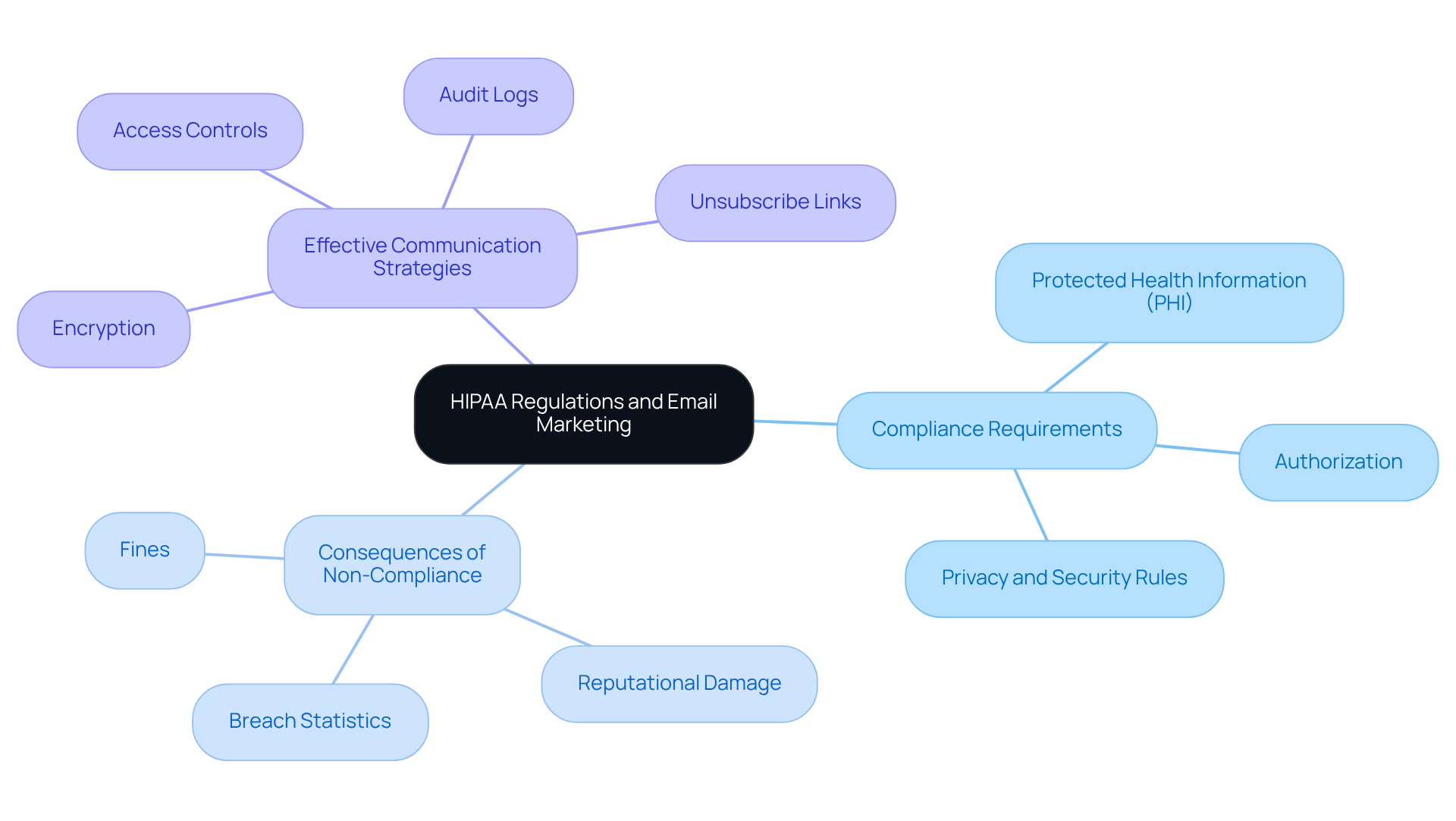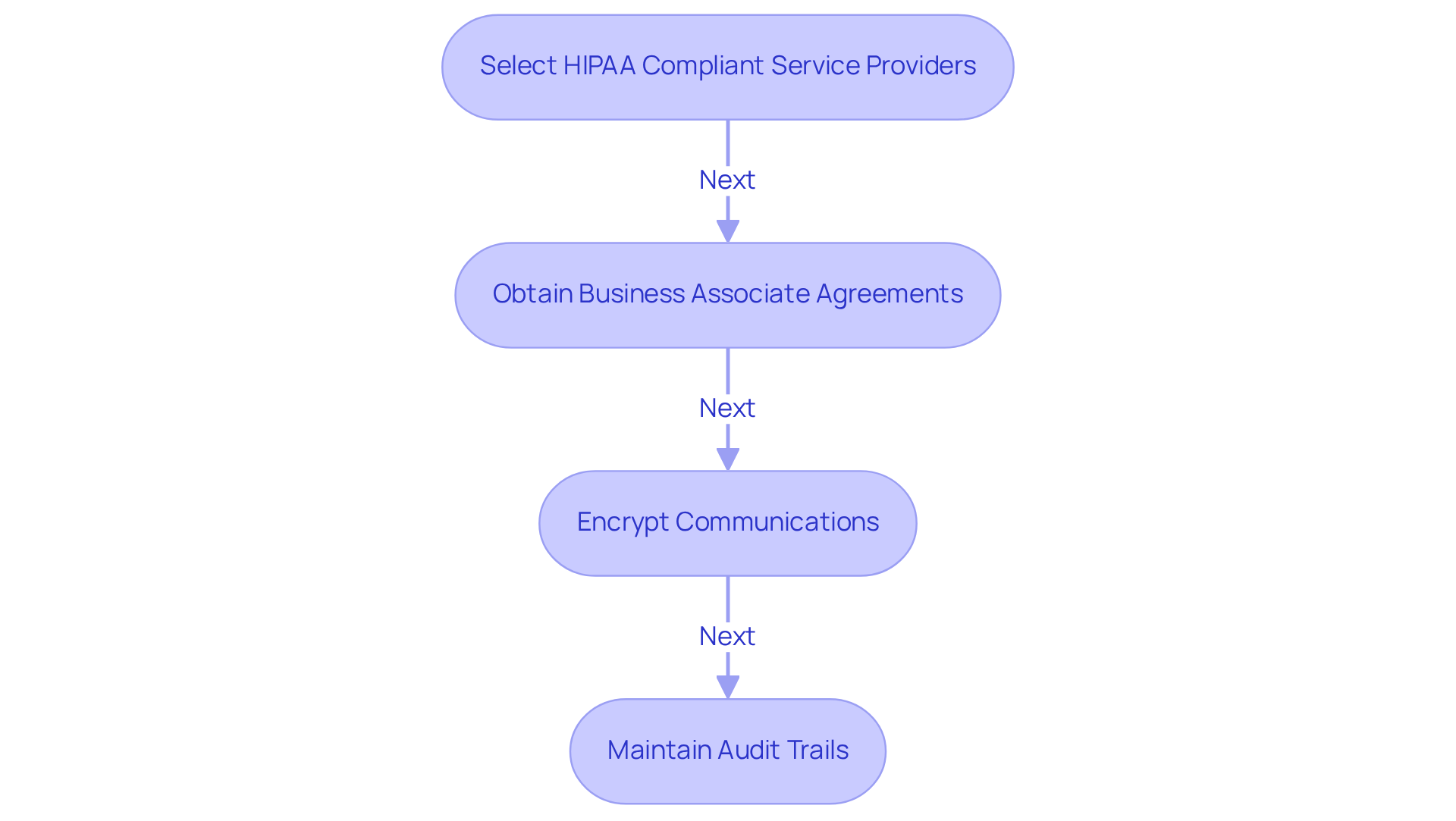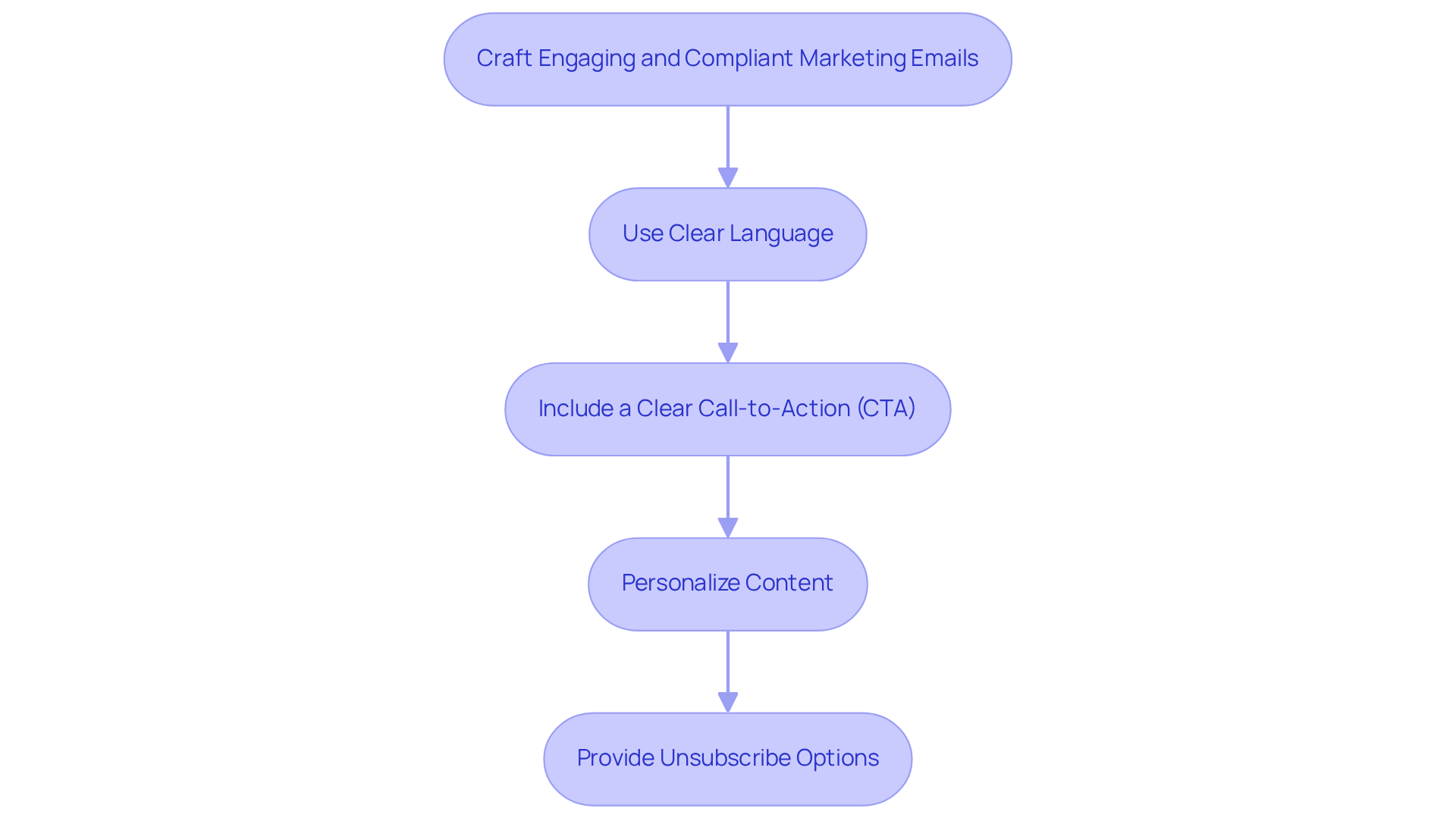Introduction
Navigating the complexities of email marketing in the healthcare sector requires more than just creativity; it demands a thorough understanding of the Health Insurance Portability and Accountability Act (HIPAA). The stakes are high, as non-compliance can lead to significant financial repercussions. Therefore, organizations must prioritize strategies that protect patient information.
How can healthcare marketers effectively engage their audience while adhering to stringent regulations? This article delves into essential best practices for HIPAA-compliant email marketing, highlighting the critical balance between compliance and compelling communication. By following these guidelines, healthcare marketers can not only safeguard sensitive data but also foster meaningful connections with their audience.
Understand HIPAA Regulations and Their Implications for Email Marketing
The Health Insurance Portability and Accountability Act (HIPAA) imposes stringent guidelines for safeguarding patient information, which is essential for HIPAA compliant email marketing. Any communication that includes protected health information (PHI) must adhere to these regulations. A nuanced understanding of healthcare regulations is crucial; non-compliance can lead to hefty fines and reputational damage. Importantly, the reach of health information privacy regulations extends beyond healthcare providers to include any business associates handling PHI. Therefore, organizations must familiarize themselves with the Privacy and Security Rules to develop effective and compliant communication strategies.
Legal specialists emphasize that obtaining valid authorization under health privacy regulations is essential for any use or disclosure of PHI in promotional communications. This requirement underscores the complexity of healthcare privacy regulations, which can vary based on the content and intent of the message. For instance, while refill notifications may not be classified as promotional under health privacy regulations, most other communications will require clear consent from recipients.
Real-world examples illustrate the impact of HIPAA on compliance with electronic communication. In 2024, the healthcare sector faced a staggering number of breaches, with over 725 large incidents reported, exposing the PHI of millions. Such breaches not only disrupt operations but can also result in significant financial losses, averaging $7.42 million per incident. This highlights the critical need for healthcare organizations to adopt robust communication strategies that prioritize compliance.
To navigate these complexities, organizations should utilize HIPAA compliant email marketing strategies that ensure the confidentiality and integrity of PHI. These platforms typically feature encryption, access controls, and audit logs, which are essential for maintaining compliance and protecting sensitive information. Additionally, incorporating a clearly visible Unsubscribe link in every promotional message is vital to respect client preferences. By adhering to healthcare regulations, companies can engage in successful electronic communication while safeguarding patient trust and avoiding the serious repercussions of non-compliance.

Identify Key Requirements for HIPAA Compliant Email Marketing
To ensure HIPAA compliance in email marketing, organizations must implement several key requirements:
-
It is crucial to use HIPAA compliant email marketing by selecting service providers that offer encryption and security features compliant with HIPAA standards. This not only protects sensitive information but also builds trust with your audience.
-
To engage in HIPAA compliant email marketing, it’s essential to obtain Business Associate Agreements (BAAs) from any third-party vendors involved in marketing via electronic communication. This agreement outlines their responsibilities in protecting Protected Health Information (PHI), reinforcing your commitment to compliance.
-
For HIPAA compliant email marketing, all communications containing PHI must be encrypted both in transit and at rest. This step is vital to prevent unauthorized access and safeguard sensitive data from potential breaches.
-
To ensure HIPAA compliant email marketing, it is necessary to maintain audit trails by keeping detailed records of all correspondence involving PHI to facilitate compliance checks and audits. This practice not only demonstrates accountability but also enhances your organization’s credibility in handling sensitive information.

Obtain Patient Consent and Authorization for Marketing Communications
Before dispatching any promotional messages that mention a patient's health information, organizations must secure explicit written consent. This is not just a best practice; it’s a legal requirement that protects both the patient and the organization. The consent should clearly outline how the patient's information will be used and provide an option to opt-out of future communications.
Consent forms must include specific elements:
- The purpose of the communication
- The types of information that will be shared
- The duration of the consent
These details are crucial for transparency and trust. Regularly reviewing and updating consent practices is essential to ensure ongoing compliance and to adapt to any changes in regulations. By doing so, organizations not only adhere to legal standards but also demonstrate their commitment to patient privacy and ethical communication.

Craft Engaging and Compliant Marketing Emails
Creating marketing messages that captivate your audience while adhering to healthcare regulations is crucial for success in the healthcare field. To achieve this, consider the following best practices:
-
Use Clear Language: Simplifying your messaging by avoiding medical jargon is essential. Clear, understandable content resonates better with recipients and significantly enhances engagement.
-
Include a Clear Call-to-Action (CTA): Encourage specific actions, such as scheduling appointments or visiting your website. Ensure that your CTAs comply with health privacy regulations to maintain trust and integrity.
-
Personalize Content: Tailor your emails based on patient preferences and past interactions. However, exercise caution to avoid disclosing any protected health information (PHI) without explicit consent, as this is vital for compliance.
-
Provide Unsubscribe Options: Always include a straightforward option for recipients to opt-out of future communications. This practice not only respects patient preferences but is also a requirement under anti-spam regulations like the CAN-SPAM Act.
By implementing these strategies, healthcare marketers can effectively engage their audience while ensuring compliance with HIPAA regulations through hipaa compliant email marketing. This approach fosters trust and enhances communication effectiveness.

Conclusion
Navigating the complexities of HIPAA compliant email marketing is not just a necessity; it’s a critical step for organizations committed to safeguarding patient information while effectively engaging their audience. By adhering to HIPAA regulations, organizations not only protect sensitive health data but also cultivate trust and credibility within the healthcare sector. Understanding the implications of these regulations is essential, as non-compliance can result in severe financial and reputational repercussions.
Key insights from this discussion underscore the importance of:
- Obtaining valid patient consent
- Utilizing secure communication platforms
- Implementing clear marketing strategies that respect privacy regulations
Organizations must prioritize:
- Encryption
- Maintaining audit trails
- Ensuring that all communications align with HIPAA standards
This approach enables them to craft marketing messages that resonate with patients while upholding the highest ethical standards.
Ultimately, the significance of HIPAA compliant email marketing transcends mere legal adherence; it embodies a steadfast commitment to patient privacy and trust. Organizations are strongly encouraged to adopt these best practices and continuously evaluate their strategies to adapt to evolving regulations. By prioritizing compliance, healthcare marketers can enhance their communication effectiveness and drive financial success through responsible and ethical marketing efforts.
Frequently Asked Questions
What is HIPAA and why is it important for email marketing?
The Health Insurance Portability and Accountability Act (HIPAA) establishes strict guidelines for protecting patient information, making it essential for email marketing that involves protected health information (PHI) to comply with these regulations.
What are the consequences of non-compliance with HIPAA regulations?
Non-compliance with HIPAA can lead to substantial fines and reputational damage for organizations, emphasizing the importance of understanding and adhering to healthcare regulations.
Who is affected by HIPAA regulations in the context of email marketing?
HIPAA regulations apply not only to healthcare providers but also to any business associates that handle PHI, meaning all organizations involved in email marketing must be aware of these regulations.
What is required for the use or disclosure of PHI in promotional communications?
Valid authorization under health privacy regulations is essential for any use or disclosure of PHI in promotional communications, highlighting the complexity of healthcare privacy regulations.
Are all types of communications considered promotional under HIPAA?
No, while refill notifications may not be classified as promotional, most other communications will require clear consent from recipients to comply with health privacy regulations.
What impact did HIPAA have on the healthcare sector in 2024?
In 2024, the healthcare sector experienced over 725 large breaches, exposing the PHI of millions, which resulted in significant financial losses averaging $7.42 million per incident.
What strategies can organizations use to ensure HIPAA compliant email marketing?
Organizations should utilize HIPAA compliant email marketing strategies that include encryption, access controls, and audit logs to maintain the confidentiality and integrity of PHI.
Why is it important to include an Unsubscribe link in promotional emails?
Including a clearly visible Unsubscribe link in every promotional message is vital to respect client preferences and comply with regulations while maintaining patient trust.






